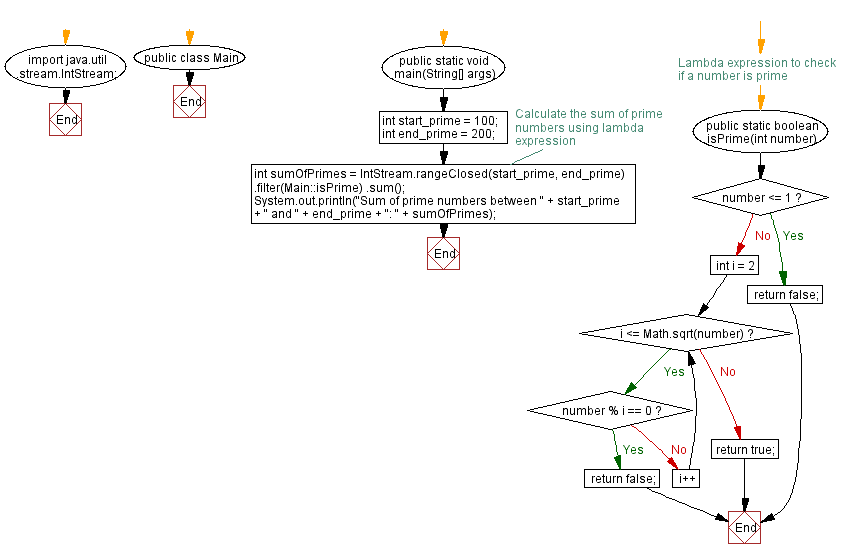Java Program: Calculate sum of prime numbers with lambda expression
21. Sum all primes in range using lambda
Write a Java program to implement a lambda expression to calculate the sum of all prime numbers in a given range.
Note: A prime number (or a prime) is a natural number greater than 1 that is not a product of two smaller natural numbers. A natural number greater than 1 that is not prime is called a composite number. For example, 5 is prime because the only ways of writing it as a product, 1 × 5 or 5 × 1, involve 5 itself. However, 4 is composite because it is a product (2 × 2) in which both numbers are smaller than 4. Primes are central in number theory because of the fundamental theorem of arithmetic: every natural number greater than 1 is either a prime itself or can be factorized as a product of primes that is unique up to their order.
Sample Solution:
Java Code:
import java.util.stream.IntStream;
public class Main {
public static void main(String[] args) {
int start_prime = 100;
int end_prime = 200;
// Calculate the sum of prime numbers using lambda expression
int sumOfPrimes = IntStream.rangeClosed(start_prime, end_prime)
.filter(Main::isPrime)
.sum();
System.out.println("Sum of prime numbers between " + start_prime + " and " + end_prime + ": " + sumOfPrimes);
}
// Lambda expression to check if a number is prime
public static boolean isPrime(int number) {
if (number <= 1) {
return false;
}
for (int i = 2; i <= Math.sqrt(number); i++) {
if (number % i == 0) {
return false;
}
}
return true;
}
}
Sample Output:
Sum of prime numbers between 100 and 200: 3167
Explanation:
In the above exercise,
- The start_prime and end_primevariables define the range of numbers within which we want to calculate the sum of prime numbers.
- The lambda expression Main::isPrime filters out non-prime numbers from the range of numbers.
- The isPrime method is a lambda expression itself, which checks whether a given number is prime or not using a simple algorithm.b.
Flowchart:

For more Practice: Solve these Related Problems:
- Write a Java program to implement a lambda expression that filters prime numbers from a range and calculates their sum.
- Write a Java program to create a lambda that generates a list of primes in a given range and then uses reduce to compute the sum.
- Write a Java program to implement a lambda expression that computes the sum of primes by first mapping each number to a boolean prime test.
- Write a Java program to chain lambda expressions to filter, map, and sum prime numbers from a stream of integers.
Go to:
Improve this sample solution and post your code through Disqus
PREV : Sort objects by attribute using lambda.
NEXT : Check case of strings in list using lambda.
Live Demo:
Java Code Editor:
What is the difficulty level of this exercise?
Test your Programming skills with w3resource's quiz.
